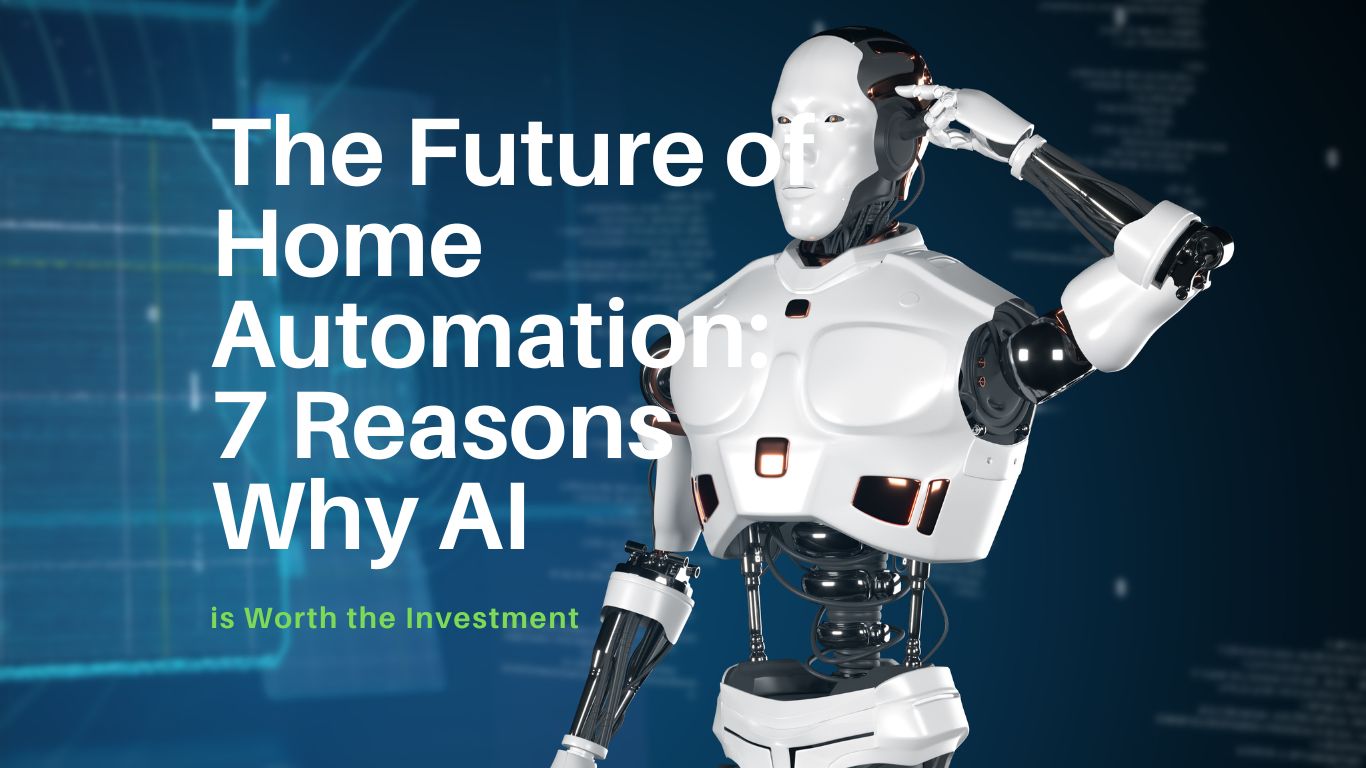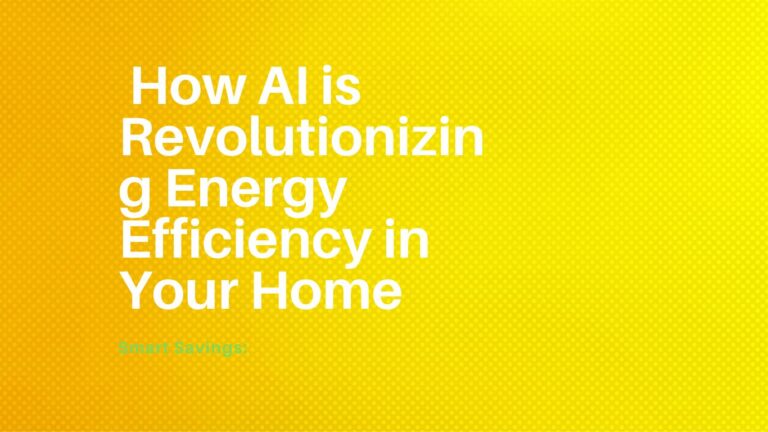The Future of Home Automation: 7 Reasons Why AI is Worth the Investment
Home automation has come a long way since its inception, evolving from simple remote controls for lighting and heating systems to sophisticated networks of interconnected devices that learn and adapt to our lifestyles.
At the forefront of this evolution is artificial intelligence (AI), a technology that is transforming how we interact with our homes.
As energy costs rise and convenience becomes a priority, homeowners are increasingly looking to AI to enhance their living environments. This article explores seven compelling reasons why investing in AI for home automation is not only beneficial but also cost-effective compared to traditional methods.
Reason 1: Enhanced Energy Efficiency
One of the most significant advantages of AI in home automation is its ability to optimize energy consumption. AI-powered systems utilize machine learning algorithms to analyze usage patterns, adjusting operations in real time to reduce waste. For example, smart thermostats like the Nest Learning Thermostat learn when occupants are home and away, adjusting heating and cooling accordingly. This capability leads to substantial savings on utility bills, with studies showing that homeowners can save between 10% to 15% on heating and cooling costs alone.
In contrast, traditional home automation systems often rely on pre-set schedules, which do not account for changes in occupancy or energy demand. As a result, these systems can lead to unnecessary energy expenditure. By implementing AI, homeowners can significantly enhance their energy efficiency, ultimately leading to lower bills and a reduced carbon footprint.
Reason 2: Increased Automation and Convenience
AI also excels in providing automation and convenience, making daily tasks simpler and more efficient. Traditional home automation systems often require manual programming, which can be time-consuming and complicated. In contrast, AI-powered systems can learn user preferences and habits, automatically adjusting settings to create a more comfortable environment without requiring input.
For example, AI can integrate multiple devices to create scenarios, such as dimming the lights and adjusting the thermostat when a movie is about to start. This level of automation not only enhances convenience but also saves time, allowing homeowners to focus on more important aspects of their lives. The value of this time-saving alone can be significant, contributing to an overall improved quality of life.
Reason 3: Predictive Maintenance and Longevity
Another key advantage of AI in home automation is its ability to facilitate predictive maintenance. AI systems can monitor the performance of appliances and systems, using data analytics to predict when maintenance is required. This proactive approach contrasts sharply with traditional systems that often wait until a problem occurs before any action is taken.
By identifying potential issues before they become serious problems, homeowners can avoid costly repairs and extend the lifespan of their appliances. This predictive capability not only leads to significant savings over time but also reduces the inconvenience associated with unexpected breakdowns. Ultimately, the longevity of AI-enhanced devices contributes to their cost-effectiveness, making them a wise investment.
Reason 4: Scalability and Flexibility
Scalability is another critical factor that makes AI an appealing option for home automation. As technology continues to evolve, homeowners will want systems that can adapt and grow with their needs. AI-powered solutions can easily integrate new devices and technologies, offering flexibility that traditional systems often lack.
For instance, if a homeowner decides to install new smart lighting or security features, AI systems can seamlessly incorporate these additions into the existing network without requiring extensive reconfiguration. In contrast, traditional automation systems may necessitate significant upgrades or complete overhauls to accommodate new technology, leading to increased costs. By choosing AI-driven systems, homeowners can future-proof their investments and avoid the pitfalls of outdated technology.
Reason 5: Improved Security Features
The security features offered by AI-driven home automation systems are another compelling reason to invest in this technology. AI can enhance security through real-time monitoring, facial recognition, and intelligent alerts that notify homeowners of unusual activity. For example, smart security cameras powered by AI can distinguish between family members, friends, and potential intruders, providing alerts only when necessary.
Traditional security systems typically rely on motion sensors and alarms, which may lead to false alarms or missed threats. The advanced capabilities of AI can help reduce these vulnerabilities, providing a more reliable security solution. Additionally, a robust security system can lead to lower insurance premiums, further enhancing the cost-effectiveness of AI-powered home automation.
Reason 6: Customization and Personalization
AI’s ability to offer customization and personalization is another significant advantage. Unlike traditional systems that often operate on rigid schedules, AI learns user preferences over time, tailoring the home environment to meet individual needs. For example, AI can adjust lighting, temperature, and entertainment systems based on user preferences, creating a unique living experience.
This level of personalization leads to increased satisfaction and comfort, encouraging homeowners to embrace and utilize their smart home systems fully. The more a homeowner engages with their smart devices, the more likely they are to see the value in their investment. In this sense, AI not only improves the functionality of home automation systems but also enhances the overall user experience.
Reason 7: Integration with Other Smart Devices
Finally, AI offers unparalleled integration with a variety of smart devices, creating a cohesive smart home ecosystem. AI systems can communicate with different devices, allowing them to work together seamlessly. For example, a smart thermostat can adjust heating and cooling based on data from smart blinds that monitor sunlight exposure.
In contrast, traditional automation systems often struggle with compatibility issues, limiting homeowners’ options when it comes to device selection. This lack of integration can lead to a fragmented experience, where devices operate independently rather than as part of a unified system. By choosing AI-driven solutions, homeowners can create a more efficient and effective smart home, ultimately enhancing the cost-effectiveness of their investments.
Conclusion
In summary, investing in AI for home automation is not only forward-thinking but also a cost-effective choice compared to traditional methods. From enhanced energy efficiency and increased convenience to predictive maintenance and improved security features, AI offers a myriad of benefits that translate into significant savings and a better quality of life.
As technology continues to advance, the advantages of AI-driven home automation systems will only become more pronounced. Homeowners who embrace these innovations today will find themselves well-equipped for the future, enjoying the convenience, efficiency, and security that AI has to offer. Ultimately, AI represents not just an investment in technology but an investment in a smarter, more sustainable, and more comfortable living environment. By recognizing the value of AI, homeowners can take a proactive step toward enhancing their homes while making a financially sound decision.



